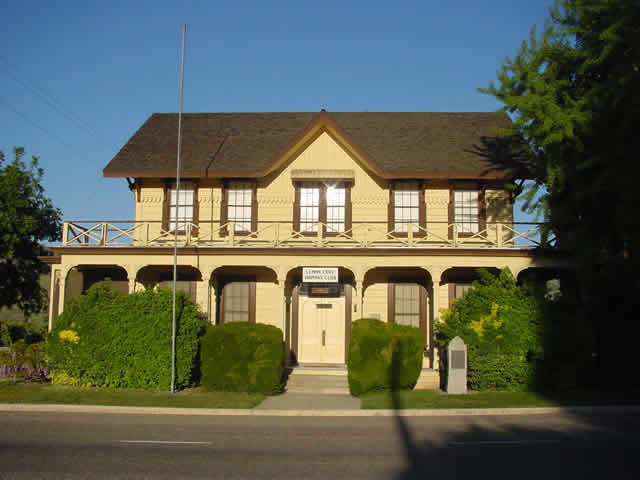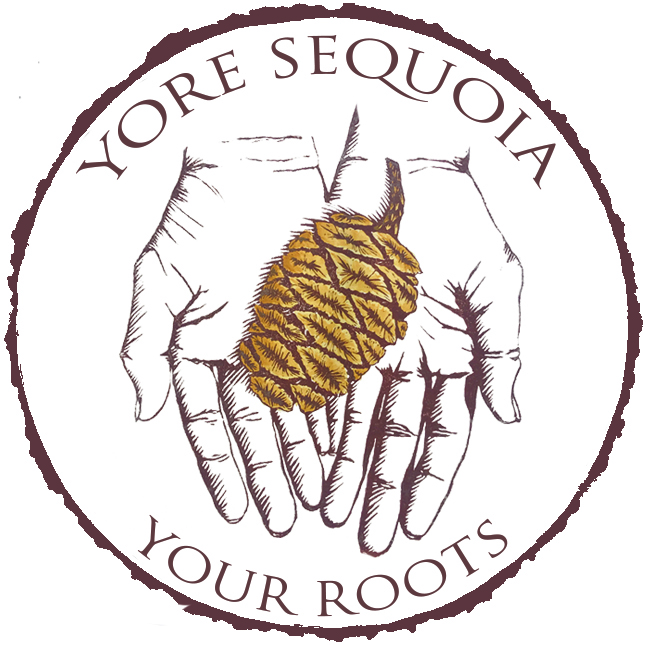
This summary account of the popularly-accepted history of Lemon Cove is typical of community histories in that it centers on one Euro-American man, in this case, J. W. C. Pogue. Look for the missing voices.
By Sarah Elliott, 20 April 2019, 3RNews

Lemon Cove, nestled in the foothills between Woodlake and Three Rivers, was first called Lime Kiln due to the lime deposits discovered in the vicinity in 1859. Lime Kiln Hill, an anchor point for the present-day Terminus Dam at Lake Kaweah, was the boundary between the Wutchumna and Potwisha Indians who lived along the Kaweah River.
The history of the community of Lemon Cove begins with James William Center (J.W.C.) Pogue (1839-1907). The Pogues came to California in 1857 and settled near Venice Hill (between Woodlake and Lemon Cove) in Tulare County in 1862.
After the flood of 1868, they moved to Dry Creek (north of Lemon Cove), where Pogue planted oranges and lemons. Until then, lemons were considered too tropical to grow in the San Joaquin Valley. When the family moved to what is now Lemon Cove, the citrus trees were transplanted successfully.
The Pogue home, built in 1879, served also as a hotel for many years and is now the headquarters of the Lemon Cove Woman’s Club.
Pogue Hotel, 1879-1903
The Pogue Hotel, originally called “The Cottonwoods,” was constructed by a ranching partnership formed in the 1870s by J.B. Wallace and C.W. Crocker of San Francisco, and J.W.C. Pogue, resident superintendent. At the height of the Mineral King silver rush, the Wallace, Crocker, and Pogue Company was organized for the purpose of buying ranch land to raise livestock.
Initially, the company grazed sheep; operations were expanded to cattle and grain farming. The ranch was known as the “Cove,” the area being well-suited for cultivation of grain.”
In 1881, Wallace died and the company was reorganized. Mrs. Wallace took her one-third, over 3,000 acres in the western part of the Cove, and the property became known as the Wallace Ranch.
J.W.C. Pogue purchased the Crocker share and became sole owner of the hotel and 6,000 acres. J.W.C. Pogue, who served two terms as a Tulare County supervisor, lived to see his vision of citrus groves in the land he pioneered. He was solely responsible for the introduction of lemons to Tulare County and the development of the townsite of Lemon Cove. It was evident that Pogue had discovered an ideal place for lemons. In 1885, he exhibited lemons at the Los Angeles Fair and won a blue ribbon.
The Pogue Hotel — as the two-story, 13-room lodging facility was known after the consolidation — accommodated travelers on the road to the Mineral King mining district and the Kaweah Colony. It was here that the Mineral King stage changed from horses to mules for the long uphill journey.
Timber teamsters, tourists, and other travelers found the hotel a convenient stopover. Meals were served to diners even if they weren’t overnight guests, and the hotel soon became a popular gathering place.
In 1894, J.W.C. Pogue surveyed 15 acres of the family ranch, dividing the parcel into 48 town lots. He named the town Lemon Cove, though later the post office changed the spelling to “Lemoncove” to avoid confusion with Lemon Grove.
The Pogue Hotel and Store (located on a lot north of the hotel and eventually contained the community’s post office) evolved as the town center and, in the early part of the century, the town’s population grew to 500. Although there was a hotel, store, post office, blacksmith shop, and more, there were no saloons. J.W.C. Pogue, who never smoked or drank, outlawed them within the town limits.
Montgomery-Pogue House, 1904-1936
In 1904, Nora Alice Pogue (1884-1984), the youngest of J.W.C. and Melvina Blair Pogue’s nine children, was deeded the Pogue Hotel, which had been her birthplace. In that same year, she married Dr. Robert Bruce Montgomery (1880-1966), Lemon Cove’s first resident physician and justice of the peace.
The Montgomerys remodeled the hotel and changed it into a single-family residence. After the hotel was converted to a residence, a small business block was developed in the vicinity.
James William Center Pogue returned to live with his daughter and her husband during the last years of his life. In 1907, he died there at the age of 68.
Lemon Cove Woman’s Clubhouse, 1936-present
In the 1930s, there was a consciousness on the part of local residents as to the historical importance and community function of the former hotel and current home. In 1936, Nora Pogue Montgomery, who had been a founding member of the Lemon Cove Community Club in 1924, deeded conditional use of the house and the one-quarter acre of land on which it is situated to the club.
This conveyance coincided with the official charter of the community club as the Lemon Cove Woman’s Club. The deed stipulated that the property would revert back to Pogue heirs in the event that the building was no longer used by the Lemon Cove Woman’s Club.
Today, the club still meets in this former hotel and home, which was listed on the National Register of Historic Places in 1991. The historic setting of the Pogue Hotel has changed very little since its construction in 1879.
The original decision as to building placement was influenced by the location of a nearby wagon road that connected Visalia and Mineral King. In later years, the old county road was improved and realigned, and the historic building is now on the east side of and adjacent to State Highway 198.
Lemon Cove has remained rural and is surrounded by cattle ranches and citrus groves. The small community has a post office, fire station, elementary school, two churches, small market, mini-mart, two 24-hour gas stations, a produce market/restaurant, citrus stands, and a campground.
